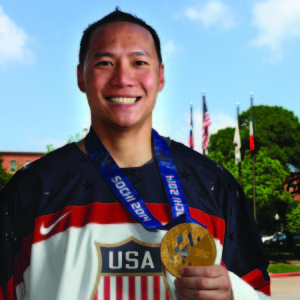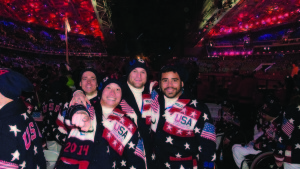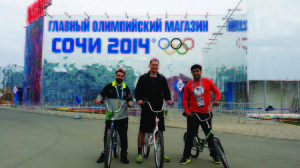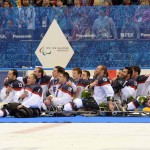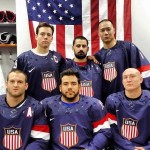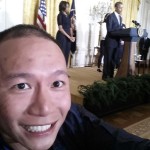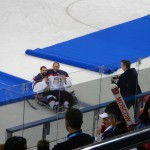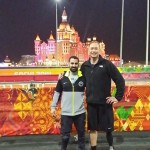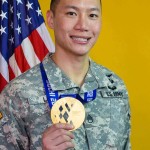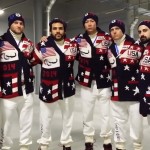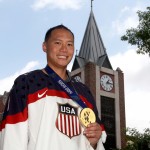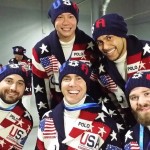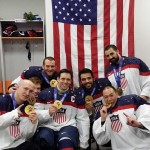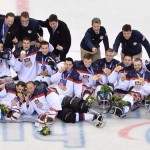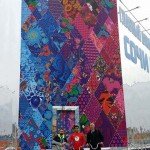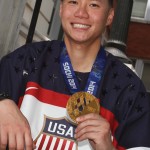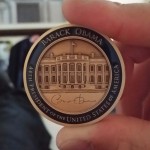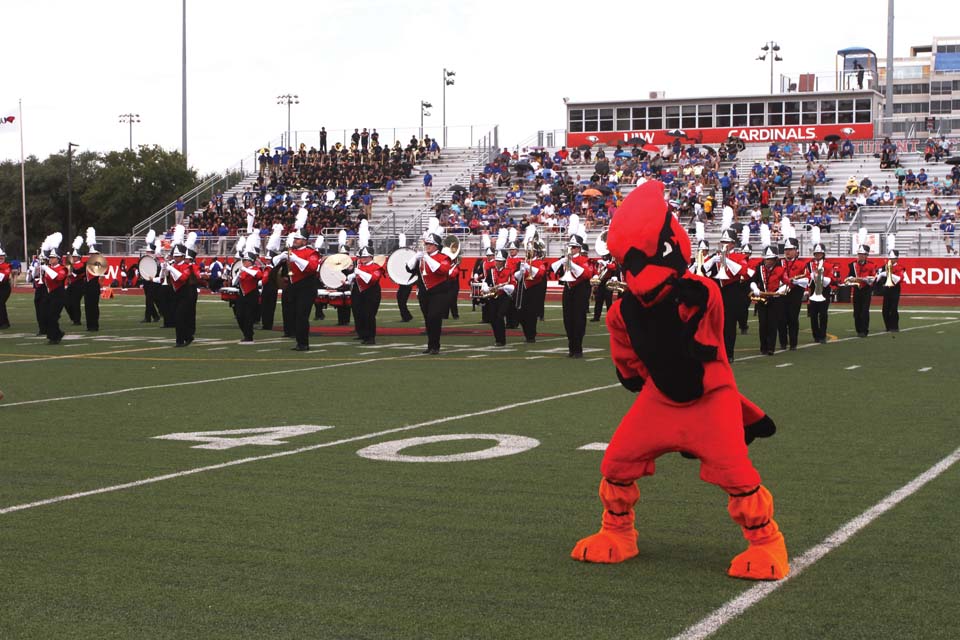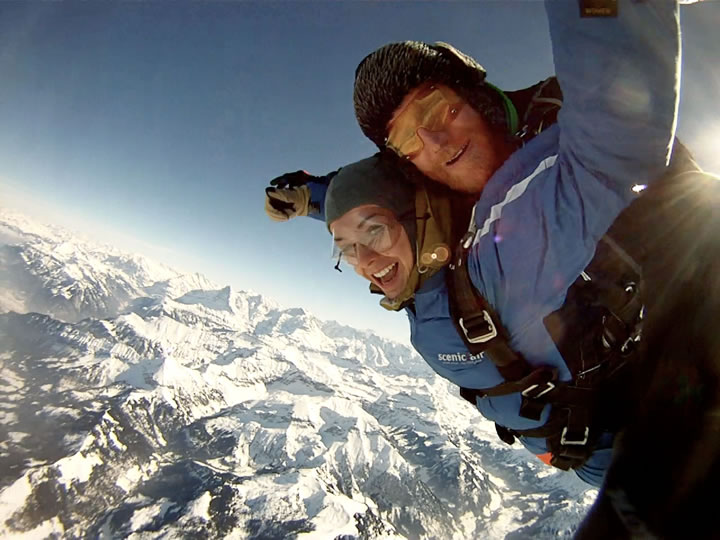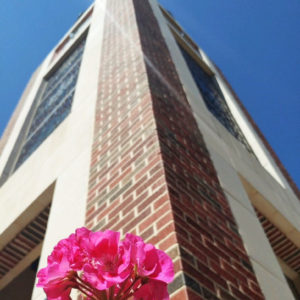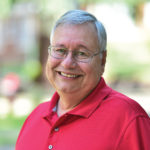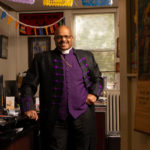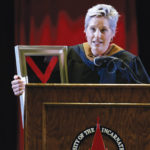By Brian Hudgins
Five years ago, Jen Lee’s goal was to walk again.
Five months ago, he was racing toward a vastly different goal – he wanted to see the U.S. flag raised high as the national anthem was heard loud and clear by thousands of Russian citizens.
Lee and his teammates on the U.S. sled hockey squad carried out that mission by defeating host Russia 1-0 in the gold-medal game of the Sochi 2014 Paralympic Winter Games. Lee, the backup goaltender, cherished the moment that he and his peers had worked for so ardently.
“Having our flag raised on top and hearing the anthem played was emotional,” Lee said. “I serve in the military and then I am representing the country in a different way. To hear the anthem on foreign soil, you are doing it for your country.”
Staff Sgt. Lee is an active duty student who is pursuing a bachelor’s degree in athletic training at the University of the Incarnate Word (UIW). Lee was born in Taiwan and moved with his family to San Francisco, Calif., when he was 8 years old. Track, tennis and basketball were all part of Lee’s teen years on the West Coast. He enlisted in the Army and went through basic training at Fort Jackson, S.C. His individual training included learning the ins and outs of becoming a Blackhawk helicopter mechanic.
Lee was stationed in Savannah, Ga., in Spring 2009 when he went for an off-duty motorcycle ride in Jacksonville, Fla. with a group in his platoon. The group was heading home when a collision with another driver left Lee’s cycle totaled as he fought for survival on the ground. The result: Lee lost a leg above the knee.
“You are going through a roller coaster,” he said. “You don’t know what is next or what is going to happen. I was 22 when the accident happened. I had been able-bodied for 22 years. First … I had to accept being disabled.”
When Lee transferred to the Center for the Intrepid, he found out the center works alongside Operation Comfort to give patients a chance to play sports.
“I had never tried ice hockey and I wanted to see what this sport is about,” Lee said. “Your main goal is to walk or run again. It would not be right if I didn’t take advantage of opportunities.” That included the opportunity to become a member of the San Antonio Rampage sled hockey team. Sled hockey is a sport designed to allow participants who have a physical disability to play the game of ice hockey by utilizing a sled with two skate blades on a metal frame.
The initial opportunity further developed after Lee gained several months of experience at sled hockey. The environment made Lee feel like he was part of a team again. He quickly realized the other players were not just there for fun or therapeutic benefits. They want to beat you. Lee’s coach, Lonnie Hannah, suggested that he consider taking on the challenge of the national team trials. Lee went on to make the 2011 national team. “Every year, you have to try out,” Lee said. “It’s not like you are set for the next four years. You have to work hard on and off the ice.”
That training process included Lee working with Ali Barrera, a certified CrossFit trainer, at Alamo CrossFit. Several sled hockey athletes have worked out there with the goals of improving stamina and upper body strength – two necessities in sled hockey.
“We do a lot of lifting and squats,” Barrera said. “It’s hard for people with both legs. But your center of balance is thrown off when you are using a prosthetic (leg). So you have to work to get athletes to squat to the proper depth depending on the point of amputation.” Barrera noted that Lee’s ability to progress to a full-depth squat was a strong illustration of the strength and agility that served him well in Sochi.
Lee characterized the U.S. team defeating Russia as a surreal experience. Sochi was a 45-minute train ride from the Olympic Village. As the train traveled past the Black Sea, the Americans had a mass of Russian fans waiting for them. The home crowd produced a sound that drowned out the family members who were there supporting the U.S.
“When we won, it was like, ‘are you kidding me?’ It was something you don’t expect. You just reflect on the training, sweat and time you put in on the ice.”
Lee is appreciative that his professors at UIW have helped him fulfill his military and Paralympic commitments while providing academic guidance in the classroom. “The professors are willing to work with me one-on-one on catching up on missed lessons,” Lee said. “Granted, I had to show them that my traveling was also part of my military assignment, but everyone was very supportive when I told them I was (also) training for the Paralympics.”
Lee was thrilled to go home after the Paralympics…once he was actually able to get home. He had to make a stop in Colorado at the team training facility before driving back home to San Antonio. Lee returned home with a new goal – becoming a motivational speaker. “I just want to educate people and be a motivation to kids who think they can’t do things because of a disability.”
An inspirational moment for Lee came when he and his fellow Paralympic and Olympic athletes met President Barack Obama at a ceremony in April at the White House
“The military veterans, including me, received a personal coin from him,” Lee said. “That meant a lot, especially because I’m still currently serving my country. Meeting the President is one of those moments you cherish forever.”
- Lee and his teamates during the National Anthem in Sochi.
- Lee poses with teammates in Sochi.
- Lee takes a selfie while President Barrack Obama speaks during the team’s visit to the White House.
- Lee and a teammate on the ice in Sochi.
- Lee and a teammate in Sochi.
- Staff Sgt. Lee with his gold medal won at the Sochi 2014 Paralympic Winter Games.
- Lee and his defense teammates at the staging area for the Sochi opening ceremony.
- Lee on campus at UIW’s clocktower.
- Lee and his defense teammates at the staging area for the Sochi opening ceremony.
- Lee and teammates display their gold medals in Sochi.
- Lee and teammates pose with their gold medals on the ice in Sochi.
- Lee and two teammates share a photo in Sochi.
- Lee poses in front of UIW’s Administration Building with his gold medal.
- Lee displays a Presidential coin received during his visit to the White House.
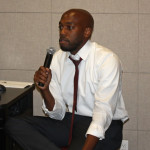 Read about NPR’s Sam Sanders’ ’07 BA experience covering the 2014 Winter Olympics: The Sochi Experience.
Read about NPR’s Sam Sanders’ ’07 BA experience covering the 2014 Winter Olympics: The Sochi Experience.


